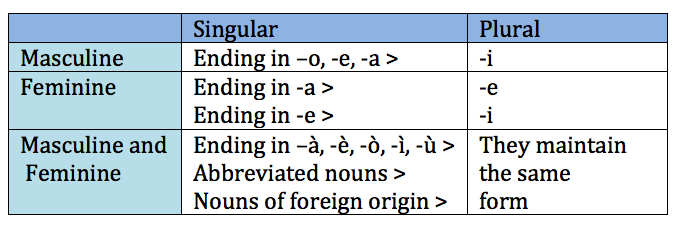Nouns: from singular to plural
 Grammar
Grammar
With respect to number, Italian nouns have two forms: singolare (singular) and plurale (plural). The singular is used to indicate a single living being or thing, while the plural indicates two or more living beings or things. The plural of Italian nouns is formed by changing the ending. Generally, the plural of nouns is derived according to the following rules:
- singular masculine nouns ending in -o have their plural in -i: bambino > bambini (‘kids’), quaderno > quaderni (‘notebooks’);
- singular masculine nouns ending in -a have their plural in –i: problema > problemi (‘problems’), poeta > poeti (‘poets’);
- singular feminine nouns ending in -a have their plural in -e: ragazza > ragazze (‘girls’), penna > penne (‘pens’);
- singular nouns ending in -e have their plural in -i: leone > leoni (‘lions’), notte > notti (‘nights’)
- singular nouns ending in a stressed vowel (-ò, -à, -è, -ì, –ù) maintain the same form in the plural: [il] falò > [i] falò (‘bonfires’), [la] città > [le] città (‘cities’), [il] caffè > [i] caffè (‘coffees’), [il] lunedì > [i] lunedì (‘Mondays’), [la] virtù > [le] virtù (‘virtues’)
- abbreviated nouns maintain the same form in the plural: [la] bici > [le] bici (‘bikes’), [il] cinema > [i] cinema (‘movie theaters’); the article makes the number clear
- nouns of foreign origin maintain the same form in the plural: [il] film > [i] film (‘films’), [lo] sport > [gli] sport (‘sports’); the article makes the number clear.
N.B. When singular nouns maintain the same form in the plural the definite article […] makes the number clear. This topic will be covered in the next Unit.

![]() Change the following singular masculine nouns to the plural.
Change the following singular masculine nouns to the plural. ![]()
albero dottore film caffè pesce gelato vino risotto dente
![]() Change the following singular feminine nouns to the plural.
Change the following singular feminine nouns to the plural. ![]()
bambina studentessa pittrice avvocatessa torta mozzarella birra città notte
Some spelling problems: -co > -chi, -cia > -ce
 Grammar
Grammar
Although the nouns belonging to the following categories form their plural according to the general rules, they usually acquire or lose a letter before the vowel forming the plural:
- most masculine nouns ending in -co, –go acquire an h between c or g and their plural endin – i: fuoco > fuochi (‘fires’),fungo > funghi (‘mashrooms’) BUT NOT amico > amici (‘friends’), nemico > nemici (‘enemies’), porco > porci (‘pigs’), greco > greci (‘Greeks’) but not with medico > medici ‘doctors’, psicologo > psicologi ‘psycologists’, sociologo > sociologi ‘sociologists’;
- all feminine nouns ending in -ca and -ga acquire an h between c or g and their plural ending -e: barca > barche (‘boats’), bottega > botteghe (‘stores’);
- masculine nouns ending in –io maintain the i in the plural if the i is stressed as in zio [pronounced zìo] > zii (‘uncles’), and fruscio [pronounced fruscìo] > fruscii (‘whirs’), but they lose it when the i is not stressed as in bacio [pronounced bàcio]> baci (‘kisses’), and viaggio [pronounced viàggio] > viaggi (‘travels’).
![]() Make the following singular nouns plural.
Make the following singular nouns plural. ![]()
libro , stazione , dollaro , caffè , panino , parente , signorina, banana , film , auto , bici , zio , mela , virtù , amico , dottore , amica , padre , studente , fungo , studentessa , psicologo , donna .
![]() Make the following plural nouns singular.
Make the following plural nouns singular. ![]()
cani , cantanti , attori , foto , sociologi , dottoresse , amiche , studentesse , mele , bar , sport , bus_, zie , banane , gioventù , ingegneri , ragazze , panini .

